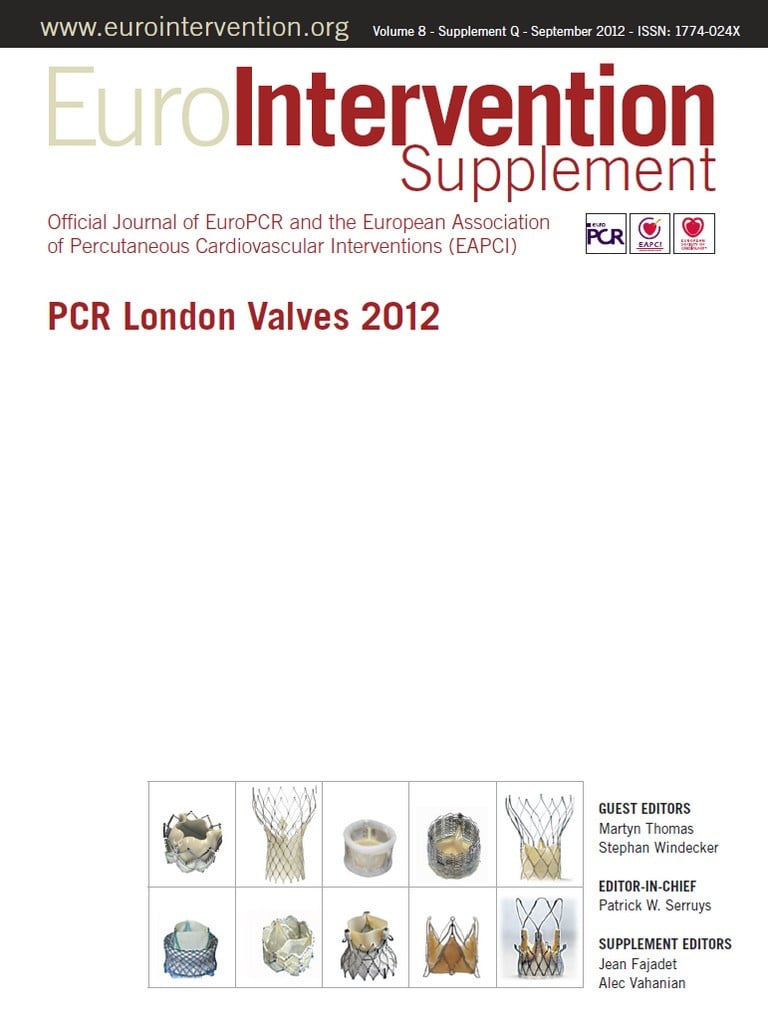![]()
Treatment and consequences of regurgitation during transcatheter valve therapies
Percutaneous closure of paravalvular mitral prosthetic regurgitation with the Amplatzer Vascular Plug III®
Aims: Percutaneous closure of mitral valve periprosthetic leak (MPL) is being investigated as an alternative to repeated surgery. Different devices have been used to attempt percutaneous repair. Our objective is to describe our population undergoing percutaneous closure with the Amplatzer Vascular Plug III ® (AVP III), and assess clinical events.
Methods and results: All patients were treated percutaneously for at least one MPL. Clinical characteristics and details of the procedure were recorded prospectively. AVP III device was used. Procedural success was defined when the device was implanted and the MPL regurgitation decreased by at least one grade. Device failure was defined as death or a new intervention on the same MPL at 30 days. Fifty-four patients aged 67±12 years. 94% with mechanical mitral valves; number of surgeries on the mitral valve was 2.08±0.94. The time from surgery to percutaneous intervention was 9.8±7.81 years. The EuroSCORE log 19.3±13.23. Clinical heart failure was 11.1%; haemolytic anaemia: 11.1% and both 77.8% was the clinical indication. The NYHA functional Class 3.3±0.58, haematocrit 28.7±4.79%, LDH 1,099±965 UI/L and MPL regurgitation 3.25±0.81. Sixty MPL (1.52±0.72/p), 59 MPL initially were attempted for closure in 63 procedures. A second procedure was done on nine MPLs and a third attempt in one MPL, with AVP III implant success in 96.2% of patients. In three patients, simultaneous closure of MPL and aortic leak were done. Seventy AVP III were initially implanted in 52 patients (1.36 AVP III/patients). MPL regurgitation decreased 1.3±0.65 grades. Complications of the procedure: embolisation AVP III one patient (captured percutaneously and implanted in the same procedure), impingement of the mitral prosthetic disc in four patients (emergency surgery two patients) and permanent pacemaker in one patient. Procedural success was 92.5%. Clinical events at 30 days: percutaneous reintervention, residual regurgitation in three patients, mitral valve replacement surgery in one patient, stroke one patient, hospitalisation for heart failure six patients and death in two patients. Clinical success was 85.1%. Follow-up: improvement of NYHA functional Class by at least 1 grade occurred in 80% (p=0.03). Compared with baseline: NYHA functional Class 2.53±0.97 p=0.034, haematocrit 34.1±5.02% p=0.002 and MPL regurgitation 2.2±1.3 p=0.047.
Conclusions: Percutaneous repair of MPL is a feasible alternative with a high immediate technical success rate and few complications. At follow-up, recovery of both functional class, haematocrits and decrease of at least 1 degree regurgitation was observed. Patients can undergo reintervention for residual or new leak.

